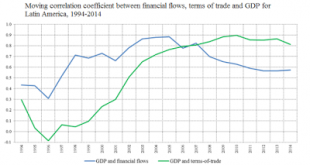The notion that trade surpluses are a measure of a country’s economic prowess dates back centuries. In 16th-century Europe, “mercantilists” from England to Venice sought to accumulate gold by promoting exports and discouraging imports. Their intellectual heirs today think trade surpluses boost national welfare, employment and economic growth, while deficits do the opposite.The preoccupation with surpluses is based on dubious arithmetic: since one country’s exports are another’s imports, it...
Read More »Latin America’s growth
From the presentation with Esteban Pérez. The graph shows that growth in the region is increasingly tied to terms of trade changes and financial flows. This was something we discussed a few years ago here.
Read More »China and secular stagnation
So in the last couple of weeks the Chinese problems have been in the news. And many suggest that the troubles in the US are not unrelated. For example, the New York Times tells us that according to Larry Summers: “The risks of a deflationary, secular stagnation in the US would be increased by a large devaluation of the renminbi.” And Krugman resuscitates Bernanke's global savings glut as the explanation for everything, from China's slowdown, depreciation and stock troubles to the recent...
Read More » Heterodox
Heterodox

